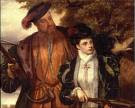Thoughts on "Utopia"
I am enjoying the short biography of Sir Thomas More at the beginning of the book. I have always been very interested in him and have wanted to learn more about him; here is my chance. I would like to know exactly why 16th century Catholic bishops, "place 'Utopia' on their list of prohibited books." I am Catholic and have always been very interested in the history of my Church, especially during the Renaissance period, as there were so many key events and changes.
More's letter to Peter Giles: back to that later.
The opening sentence about Henry VIII; "invincible king, a prince adorned with royal virtues...” seems to be a purposeful statement flattering Henry since the rest of the story describes everything that is wrong with the European monarchies and the monarchs themselves.
Thomas More travels to Flanders on business for the king. He is there to discuss and settle with Charles of Castille. Their meeting is ended because there is no agreement made. More travels to Antwerp to see his friend, Peter Giles. He is the kind of friend we all want and want to be; kind, patient, affectionate, virtuous, wise, witty, cultured, courteous and trustworthy. (Wow)
Peter introduces More to his friend and seasoned traveler; Raphael Hythloday. Raphael is a philosopher who, "knows Latin and is learned in Greek." He knows much about "unknown people and lands," having accompanied Amerigo Vespucci on at least three voyages. On the last voyage, he is purposely marooned with twenty-four others, left at a fort and, "more anxious to pursue his travels than afraid of death."
Raphael claims to have introduced the compass to the natives there, called "Utopians." Formerly timid about traveling, they are now completely confident, (overconfident, even), and unafraid due to the use of the compass. This passage is a little corny. Is the compass symbolic? Is Raphael God's messenger?
"The difference between service and servitude is one syllable." Sounds so modern, cool. Raphael desires neither wealth nor power and has given away all of his possessions.
"Most princes apply themselves to the arts of war, in which I have neither ability nor interest, instead of to the good arts of peace." This is in part his argument against counseling to kings as More suggests he should.
Raphael begins to relate a discussion between Cardinal John Morton, a lawyer, a friar, and himself. (Interesting that Morton was so impressed with More as a child, that he arranged for his Oxford education). It begins with the execution of simple thieves, unfair and ineffective, says Raphael. Instead of punishing theft so severely, help all men to be able to earn a living.
The production of wool is another reason for thievery, "every acre enclosed for pasture.” (for sheep). Feudal tenants are dismissed with no place to go; whole families.
Monopoly and oligopoly - surprised to see these terms in use so long ago.
"Hideous poverty exists side by side with wanton luxury."
"It seems to me, most kind and reverent father", says Raphael, "that it is altogether unjust to take someone's life for taking money. Nothing in the world that fortune can bestow is equal in value to human life."... "But then, what prevents men from making other laws in the same way-perhaps even laws legalizing rape, adultery, perjury?" How about abortion? This argument is so relevant to what is going on in the world today. The disregard for human life, (especially in this country), is leading to all kinds of treachery.
How can England's "new law" of Christ be harsher and more severe that the law of Moses where death was never a penalty for any crime, certainly not theft.
Persian Ploylerites:
Criminals work constantly, make restitution, atone for sins, ("see the necessity of being honest"), slaves, have a chopped ear for ID, can be whipped, wear a special badge, must stay in own district, carry no money or weapons, "accept punishment in the spirit of obedience" and possibly earn freedom. Or try to escape and die for doing so. Is this the labor camp?
I love reading this book.
More says to Raphael, basically he is now convinced that, "There is no place for philosophy in the council of kings." But, You can have some positive impact and you have the obligation to try so that, "What you cannot turn to good, you may at least make as little bad as possible."
Utopia sounds like Communism with the presence of God.
Luckily, a ship of Romans and Egyptians wrecked on Utopia and they never left. They taught the Utopians many important things they may not have otherwise figured out. This passage made me laugh.
I like this quote, "Only rich men can afford to seek positions which ought to be held by the wise."
Subscribe to:
Post Comments (Atom)











1 comment:
Thanks for the bit about Cardinal Morton.. very interesting!
-your classmate, Abby
Post a Comment